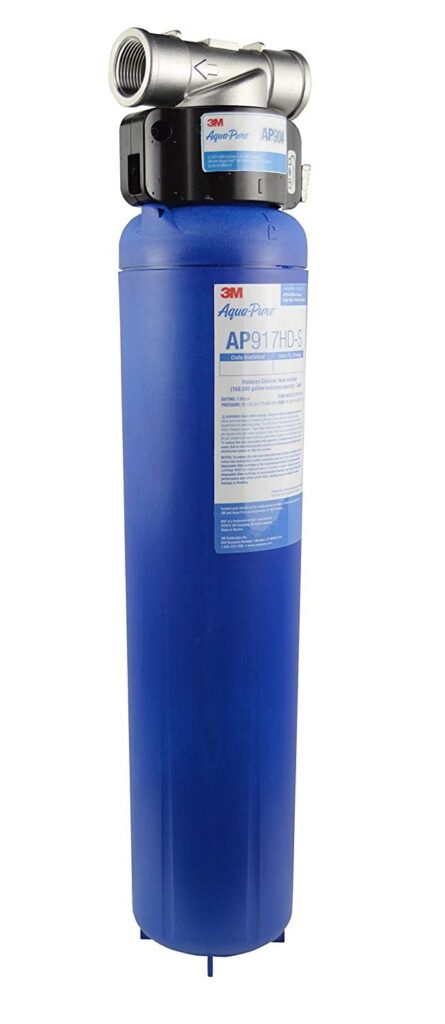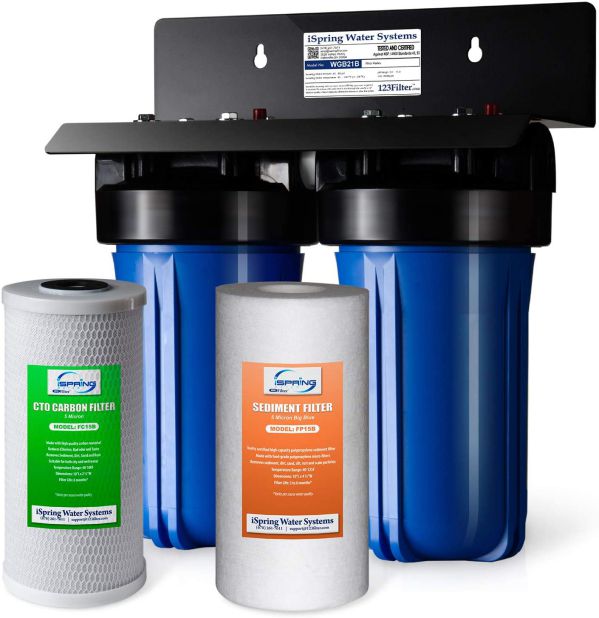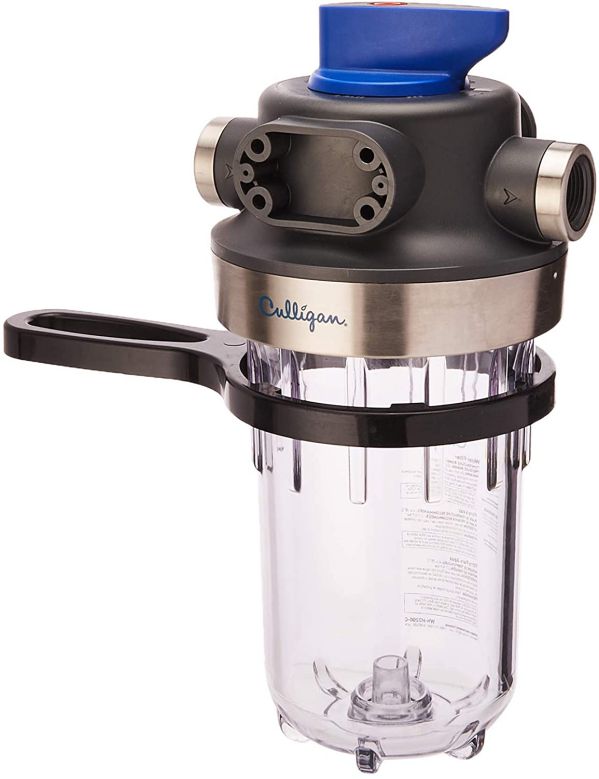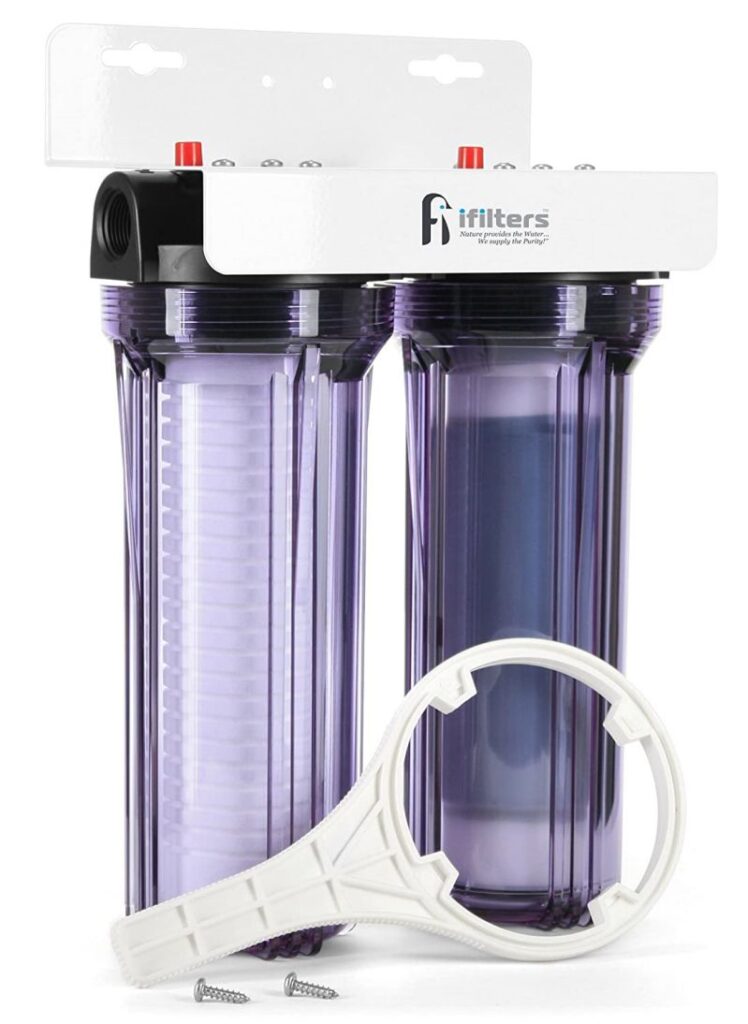Millions of families in the US depend on private well water for their daily water needs. If you are one of them, then you know that no one will ensure the quality and purity of water but you.
The well water needs to be treated because of the presence of bacterias like E.coli and Protozoa, which causes water-borne diseases. There may even be some viruses. Moreover, the well water will surely have a high level of hard minerals, the high level of calcium, magnesium, and iron not only creates health problems but are also not good for your plumbing pipes, valves, and water equipment.
The simple solution is to install a whole house filter, and it can efficiently remove all these contaminants. We have prepared a list of the best whole-house water filters that are capable of effectively treating the well water. Go through them, and you will surely find one for your needs.
| iSpring WGB32BM (Best of The Best)

|
| iFilters MWH-D-WELL (Cheapest yet Quality Filter)
       |
| Home Master HMF3SdgFeC
       |
| 3M Aqua-Pure
       |
| iSpring WGB21B
       |
| Culligan WH-HD200-C
       |
Table of Contents
Best Whole House Filter for Well Water
1. iSpring WGB32BM Whole House Filtration System for Well Water
This is a whole-house filter mainly installed at the point of entry in the house. With its 3 efficient filter stages, it removes most of the contaminants from water.
When it comes to filtering the well water, which is contaminated with a lot of dissolved solid metals and dirt, this filter system is the best choice. It is built to handle water with extreme contaminants.
The first stage of the filter removes the dirt, sediments, and particles bigger than 5-micron size from the water. The second stage is a 5-micron carbon block filter, which mainly removes the bad odor and bad taste. Whereas the third and last stage is there to clear the dissolved solids like iron, manganese, and arsenic present.


It is that third filter that gives the filter the ability to remove a large number of dissolved metals from the well water.
Moreover, all the filter stages are certified by a third-party laboratory to meet the NSI standards. If you want this filter to work properly, then make sure that the temperature and pressure of incoming water stay inside the range of 40 – 100 F and 40 – 80 psi.
Proper pressure of the water is ensured with its 1” inlet and outlet ports. Other than that, the installation and maintenance of the water filter are easy, and you can refer to the manual or the installation videos as installation references, which is why you may not need a plumber to do that for you.
With a 1-year warranty from the manufacturer, this product ensures peace of mind for customers.
What we like
- Removes particles as small as 5 microns.
- Standard 20″ cartridge size.
- Removes iron, manganese, and arsenic as well from the well water.
- There is a pressure relief button.
- It covers most of the water contamination.
What we don’t like
- It is an expensive system.
- There may be leaks.
2. iSpring WGB21B 2-Stage Well Water Whole House Filtration System
This is another filter from Spring with 2 stages to deal with most of the contaminants before the water gets to your pipings. It will protect your equipment like water heaters, countertop water filters, washing machines, etc.
The unit features a very effective 2-stage water filtration system. The first stage is to remove most of the large-sized particles, which are larger than 5-micron size, like dirt and sediments specially present in the well water.
In the second stage, there is a carbon block filter that will remove the very fine sediments, rust, VOCs, and other contaminants, including chlorine as well.
It will provide the pure water needs for a family of four members for up to 1 year, and it has the capacity to supply 50,000 gallons of pure water before cartridges need to be replaced.
Another notable thing about this well water filter is its 1-inch input and output filter that allows 15 GPM water to pass. This will ensure no water pressure drop in the system once the installation is complete and the filter is in full working condition.
The installation process is as easy as it can get since the whole unit comes pre-assembled onto the mounting bracket. It also comes with a filter wrench that will make routine filter changes much quick and easy to change.
You can also refer to the manual or watch youtube videos. You may not require a plumber, but still, if you feel like then, you can have the plumber do the installation for you.
There is also a pressure release valve to release the built-in pressure in the system.
The system comes with a 30-day money-back guarantee and a 1-year manufacturer’s warranty along with a free lifetime of technical support from the iSpring.
What we like
- Effective filtration.
- Water pressure won’t drop.
- It will last for almost a year.
- Easy installation.
- It is NSF certified.
What we don’t like
- It doesn’t soften the water.
- Need to use Teflon tape for leakage.
3. Culligan WH-HD200-C Whole House Well Water Filtration System
This water filter is from a well-known brand that provides durable and reliable water purification systems. This is an extremely versatile filter and can clean most of the contaminants from the well water before it reaches your plumbing pipes.
The first thing you will notice about this whole house filter is its size. The system is very compact, so you won’t face any problems when installing, even in tight places.
If we talk about the installation, then the system comes with most of the things necessary for installation but not all the things. You may need to put in some effort to find nuts and bolts.
We suggest that you hire a plumber to do the installation if you go with this unit. Besides that, the set contains the filter and battery monitor.
The inlets and outlets of the filter are of stainless steel and are 1 inch, which doesn’t let the water pressure drop a bit.
This filter removes most of the contaminants from the well water like sediments, rust, scale, dirt, fine sand, silt, bad taste, and odors. But keep in mind this depends on the cartridge used.
The kit comes with the mounting bracket, WR-HD housing wrench, mounting bracket, filter life monitor, and battery. The battery is there because this filter works on it. Besides this, the housing is extremely rugged and works with almost all types of cartridges.
What we like
- Affordable.
- Compact size.
- NSF certified.
- Comes with filter
What we don’t like
- The kit doesn’t come with everything.
- The cartridge will determine the water quality.
- The seals are not so tight.
4. Home Master HMF3SDGFEC Whole House Water Filtration System
The impressive thing about this water filter is that you are getting a whole-house water filter, which costs a little more than what an under-sink water filter would have cost. There is high chance that the shower you are taking with the unfiltered well water may contain toxins.
The solution is to install a whole house filter, and there is no better filter than this well water filter from a HomeMaster. It comes with 3 filtering stages, which remove almost all toxic contaminants from the water.
These 3 stages are very effective in removing most of the chemicals, dirt, rust, and other impurities from the water. It removes 95% of iron and manganese from the water efficiently, along with the bad odor and bad taste of water.
The first stage can easily remove particles of size of more than 1 micron, and the second stage removes only iron, which makes it very suitable to use for well water. And the third stage consists of granular activated carbon, which removes most of the harmful chemicals from the water.


Another thing to know about this well water filter is that it is not ideal for city water because of the presence of chlorine. However, it can remove some chlorine from the water but not that efficiently, which specially designed water filters for chlorine removal can do.
With a capacity of 100,000 gallons of water, it can provide pure water for up to a year to an average-sized family. With the 2 years warranty from the manufacturer and its highly appreciated customer support, you can surely consider this for your pure water needs.
What we like
- High water filtration capacity.
- Removes dissolved metals like iron and manganese.
- Ports are oversized to ensure a high water flow rate.
- It prevents staining.
What we don’t like
- Not good to filter chlorine.
- Leaking problem from O-rings.
5. 3M Aqua-Pure Whole House Well Water Filter System
No matter what type of water comes to your house, whether it is chlorinated water from the municipality or water with heavy minerals of a well, this water filter is an all-in-one solution. It can treat both types of water very efficiently.
This water filter will remove the particle’s size which is not more than 5 microns, and the benefit of that is when the filter has a lower micron rating than the water passing, it clogs faster, and it needs to be changed more frequently.
But with the 5-micron size, you get pure water as well as the long life of cartridges while offering enough flow rate. It also removes chlorine by up to 90%.
Another impressive thing about this well water filter is its high flow rate, a filter when attached to the waterline, will reduce the pressure at the tap because filtering water takes time, but the 10-20 GPM flow rate, which this filter provides, can easily satisfy the water needs of small to medium families.
When it comes to the durability of this filter, it has steelhead and the housing is sturdy enough to easily last for a decade if you change the cartridge by following the proper method. Also, the operating cost of the unit mainly depends on the cartridge used, its lifetime, and its price.
This is one of the smallest whole house filters for well water you can find in the market, and with a footprint of just 12 square inches, it can be fitted easily in the smallest places.
Moreover, the installation of this unit is also easy, someone who had installed a water filter before can do it in no time, and even if you haven’t done any installation, then it won’t take more than a few hours to do the installation.
What we like
- An affordable unit.
- Materials used for construction are safe.
- It also softens the water.
- Easy replacement of filter cartridge.
- Easy installation.
What we don’t like
- Removes hardness moderately.
- No indicator for when to change the cartridge.
6. iFilters LWH-D 2 Stage Whole House Well Water Filter
If you are looking for a whole-house filter for well water that can provide you with quality water and can last for years, then iFilters LWH-D is the right pick.
Water passed through those dual stages will be free from sediments, sand, and silt. It also removes the bad taste and odor, which is the result of chlorine present in the water. It will remove the contaminants which are bigger than the 5 microns in size.
With a port dimension of 3/4”, this filter has a water flow rate of 3 GPM, and with this flow rate, you will get enough filtered water to satisfy your water needs. The changing of a cartridge is also an easy process, and there is a pressure release valve on the top when changing a cartridge.
The compact size of the unit allows you to install it anywhere you want, and you can place it near the washing machine or water heater. You can even install it under your kitchen sink, but we suggest that the water entry point will be a suitable place for installation.
This is because if the well water is filtered out before reaching the pipes, then it can increase the lifetime of pipes and valves.
You can expect cartridges to provide clean water for 6 months. Note that the lifetime of the cartridge will vary based on the quality of water it is filtering.
The component used for the construction of this filter is made out of the NSF-approved components, which ensure that the materials used to make the products follow the strict terms set for public health by the NSF community.
What we like
- 3/4” NPT ports.
- Removes particles of size more than 5 microns.
- Little maintenance is required.
- Offers flow rate of 3 GPM.
What we don’t like
- Cartridge life is just 6 months.
What is a Well Water Filtration System?
The well water, as mentioned, has a high probability of having harmful contaminants in it. A whole house well water system will have a series of filters designed to remove most of the contaminants from the water entry point of your house. The benefit of installing at the entry will save your plumbing pipes and valves from any damage due to the minerals in the water, and it will also keep your showerheads, sinks, and taps free from lime scales caused by hard minerals.
These well water filters are available in a wide range, and you can choose one based on the high level of a specific contaminant in the water. Some filters are specially designed to remove a high quantity of specific contaminants.
These water filters remove hard minerals, toxic chemicals along with VOCs, lead, and heavy metals from the water.
Before choosing a water filter, you should test your well water and see the level of contaminants. If any specific toxin or metal level is high, then you can go for the one that will specifically attack that contaminant more.
Why Should You Get a Well Water Filtration System?

The quality of water is ensured when the water is coming from the municipality because they follow the strict regulation set by the EPA for public health, which makes you worry-free. After all, you know that the water coming to your house will be safe to use.
When you use the water from wells without filtering, then you may not know, but it may contain harmful parasites and chemicals that may have leached into the water from the surroundings. You can always check for the quality of water, but with the rapid change in the industry, the well water isn’t going to be safe for longer.
When you use the water from a private well, you don’t know the quality of it because there are no regulations to follow for the well water. Many homeowners believe that the water from the well will be safer since the soil acts as a natural filter. But the truth is, according to a study conducted in 2009 every one well from five had a dangerous amount of toxins and disease-causing bacteria.


The well water may contain bacteria, viruses, parasites, heavy metals, radionuclides, fluoride, and even more harmful things. If the minerals and other chemicals are present in small quantities then they will change the taste and odor of the water in small quantities, but when the large amount is present, it becomes risky for you, your family, and also for your water appliances.
If you don’t have a premium well water filter, then these things will have an open way to get into your house and can drastically affect the health of your loved ones and water appliances.
Different Types of Water Filter Systems
There are mainly two categories from which you can choose the water filter. These categories are based on the place of use, where the filter purifies the water.
It can either be under the sink or at the water entry point on the mainline. The filters which are on the mainline are known as “Whole House Water Filters” because they remove most of the contaminants from the water before it enters the house, and the pure water is available for use in every tap and faucet. The filters used at a specific place are known as ” Point of Use ” filters, which provide filtered water at only that point.
Filters are furthermore divided by the type of contaminants and how they are removed. A whole house water filter is made up of different stages, which are a combination of these different filters to achieve the best results. To know more about the different types, keep reading.
Activated Carbon Filter
An activated carbon filter is used as a pre-filter to protect the next filtration stages. It removes the fine silt and sediments from the water.
The carbon filter works by absorbing contaminants permanently from the water, so it is no longer present in the water. The efficiency is determined by the quality of a granule, and a granule vaguely means the smallest particle of substance, which results in a large particle.
The use of carbon for the absorption of toxic materials like heavy metals, chemicals, and pesticides is justified because the surface area of a single gram of carbon is 32,000 square feet. This makes it very efficient at absorbing particles and gives it a longer lifespan.
Sediment Filter
The sediment filter is a mechanical filter, which means it removes the particle by physically blocking it. The main function of a sediment filter is to remove the large particles so that they don’t reach the upcoming stages and clog them.
The size of the particle it can remove depends on the opening of the pores in the filter. Generally, the rating of this type of filter is given in terms of a micron. It indicates that particles that are bigger than a certain size will be blocked by the filter.
The ability of this filter varies based on the type of blocking structure and material used. It can be as simple as a mesh structure, or it can be highly complex pore structures that not only remove particles but also remove ultra-small pathogenic organisms.
If the rating of the filter is 5 microns, then it will remove particles that are visible to the naked eye. While the rating of a 1-micron sediment filter will remove the particles which you can’t see with the naked eye or can barely see through a microscope. Moreover, there are also filters available that remove particles of size up to 0.5 microns. With this rating, it can remove most of the suspended particles along with cysts.
Note that this filter doesn’t remove any bacteria, minerals, or chemicals present in the water.
Reverse Osmosis Filter
Reverse osmosis systems are highly efficient water filters, and they remove most of the contaminants from the water. Even if some particles are escaped from the sediment and active carbon filters, then they are removed here. This is because this filter has the smallest pores, which won’t let even the tiniest particles pass through.
The reverse osmosis filter system removes fluoride, hexavalent, chromium, arsenic, nitrate, copper, and if you have a water softener installed before the filter, then it will remove the salt as well. It can also remove some of the pathogens from the water, but not all.
The working mechanism is simple; it uses a permeable membrane. On one side of the membrane stays the contaminated water, which is made to pass through with the help of pressure. The water can pass through the membrane but not the particles, particles stay behind, and you get the clean water on the other side.
The downside of this filter is that it is a slow process, I mean extremely slow. Moreover, it will also create wastewater during the filtration process. The slow process of filtering will result in decreased pressure at the tap, and the wastewater will increase the water bill.
UV Water Filters
UV water filters are the most prevalent filters. They are most effective in removing disease-causing bacteria and viruses from the water.
With the help of ultraviolet light, the removal is done. The water which is contaminated is exposed to high radiation, which will neutralize the bacterias. Once they are neutralized, they can’t reproduce, and bacterias that can’t multiply themselves are not capable of making you sick. This treatment of pathogen removal is the highest level of filtration process to remove micro-organisms.
The plus point of this filter is that you won’t have to pour any additional chemical into the water or heat it. Another thing to note is that they only remove viruses and bacterias so, it is always used in combination with other filters to remove other contaminants.
Choosing the Right Whole House Well Water Filtration System


The choice of the right whole-house filter system for well water depends on many factors. Before you purchase any filter, you will have to first know what kind of contaminants are present in your water and in how much quantity. To determine that, you can use separate kits available in the market or send the water sample to the state lab.
The well water will mostly contain the leached chemicals, a high amount of hard water minerals. And one study shows that most of the well water will have E.coli or coliform bacteria present in it. So make sure that the filter that you choose can remove these contaminants effectively.
Also, keep in mind that different whole-house filters will have a combination of different filter stages so choose the one which is most suitable to remove the contaminants present in your tap water. Before buying a filter, check the fine details about the contaminants each filter stage can remove.
Moreover, the size of the whole house water filter will mainly depend on the size of the family. A filter should provide you with enough flow rate that everyone in your house should be able to use the water without the pressure drop. A good way to calculate the flow rate is to know the flow rate of all the taps and faucets which are simultaneously going to stay on. The filter should provide that much flow rate, to the least.
What to Consider When Buying a Well Water Filter?
Water filter companies flood the market every year with so many water filters. They vary significantly from each other in terms of their size and the technology used to remove the contaminants. And it isn’t an easy task to choose the one for your specific needs. It will be helpful if you keep these things in mind before purchasing a water filter to treat the well water.
Daily Usage
The consideration of your daily need is inevitable, because without knowing your daily needs, if you purchase a water filter that can’t supply enough water, then it will be useless.
The water needs depend on the number of family members. If your daily water needs are high, then you will need to buy a water filter that can supply enough water to fulfill all your water needs. You will need a filter that provides a high flow rate and can filter a large amount of water in less time.
If your daily need is less, in essence, for smaller families, you can go with the small water filters. A good rule of thumb to follow when choosing a well water filter is to go for one which produces more water in an hour than the number of family members.
Budget
Before you start your search for the best well water filter, you must have a budget in mind as it can simplify many things. Once you have a number in mind, you can go for the one which suits your needs based on the water quality. It will also help you to go for the alternatives which can do the job rather well if your budget is low.
We always recommended going for the highest quality filter that you can find because here, you are compromising your health. If you can’t find the one which suits your needs in the budget you chose, then your budget should be flexible.
Contamination
When selecting a water purifier, as I have mentioned several times by now, you will need to first check the amount and types of different contaminants present in the water.
If it contains a high amount of solid metals, VOCs, and chemicals, then the water becomes alarmingly dangerous to be drunk by a human being. Also, the high amount of nitrate, if present, raises great concern.
The solution is to use the purifier, which is specifically designed to remove specific contaminants. If the water contains a high amount of bacteria, then you can go with the UV filter. This filter will neutralize those bacteria with strong radiation from a UV lamp. If bacteria is not your concern, then you can go with the RO filter, which will filter out most of the toxic content through its membrane.
There are filters available in the market that combine both UV and RO filtration stages in a single filter, so you don’t have to purchase two separate filters. Another option is to go with the UF filter, which is best when you have a TDS-free water supply and removes most of the suspended bacteria from the contaminated water.
Electricity
Water filters are available in different sizes and types. Some use electricity, and some don’t. The filter which can work without electricity is suitable to use when there is a problem of frequent power outages, or power doesn’t stay available for long periods.
RO and UV filters are most efficient to remove most of the contaminants from the water, and they work on electricity. UV filters use electricity to produce radiation for the removal of pathogens, while in RO filters, the pressure is created with the use of electricity.
If you have any one of the two and you don’t have electricity, then you will have to arrange for an alternate power source for them to work.
We suggest that you go with the electric purifier because they remove almost all the contaminants which are hazardous to human health. On the other hand, purifiers which can work without electricity are not that effective. They can remove only some of the chemicals and germs along with the sand and suspended particles.
Legitimacy
When you are approached at your home by a filter salesperson, then it is a red alert that you will need to be careful Because in recent years, there are many reports of water purifier scams, and most of them were from lone salespersons convincing you to buy their water purifier. It is not that all salespeople who sell water purifiers are there to scam you, but you can’t take a risk with your health.
Water purifiers became an essential part of life that keeps you healthy, but with the increasing demand, there is a rise in the number of companies that provide water purifiers at cheap prices, and no quality checks have been performed on them.
So, to be on the safe side, always buy the water filters from the registered franchises and also check the customer’s reviews online. There is no better source to check the quality of the product and services offered by the company than customer feedback.
Moreover, always check the detailed description of the contaminants that the particular filter is capable of removing.
FAQs
Q. What Are Some Ways to Know the Contaminants Level in The Well Water?
Direct use of well water from a private well is not recommended at all, and it may contain harmful contaminants. To know exactly what type of contaminants are present in the water, whether it is chemicals, bacteria, or simply high TDS levels, you can use many water testing kits available in any of the stores.
Another way to get the exact presence of contaminants and their quantity is to just send the sample from your well water to any water testing company, and they will provide you with a detailed report on the level of the contaminants.
After analyzing this report, you can decide which water filter is best suited for this well water.
Q. Why You Shouldn’t Install a Well Water Filter Outside?
When it comes to the whole house filters that are designed to purify the well water, are intended to be installed at the point of entry in the house. There are some filters that exist in the market which you can install outside, but with the majority of filters, you can’t keep them outside.
The reason is, filters are designed to work satisfactorily in a certain temperature and pressure range. When they are installed outside, the temperature doesn’t stay in this range. It drops significantly low in winter and reaches a very high level in summer. Filters don’t work as intended in these extremes.
You can always consult the manufacturer to see if it is possible to install the filter outside.
Q. Is It Safe to Drink Water Directly from A Whole House Filter?
It depends on what your whole house filter removes from the well water. A simple whole-house filter will only deal with the bad taste and odor of the water, and it won’t remove any of the other contaminants. There is no guarantee on the purity of water from a whole house filter. So, if you want to use water directly from a whole house filter for drinking, then first get it checked at any lab for contaminant levels.
Q. How Much Does It Cost to Install a Best Whole House Filter?
If you want the simplest whole-house water filter then the price can vary between $250 to $500. But we suggest that you always keep in mind the long-term use of a filter than the initial cost. Because it might cost you less now, but in the long run, it will require much more maintenance and frequent cartridge changes.


On the other hand, a filter that is costly and has a quality filter will not bother you so much in terms of maintenance. If you want a better filter, then you will need to keep your budget high.
Q. Are Whole House Water Filters Worth It?
If your daily water needs are fulfilled by well water, then definitely a whole-house filter is worth it. The well water is going to have many contaminants like sediments, leached chemicals, rust, and disease-causing microorganisms.
A good whole-house filter takes care of all the contaminants in the water, and it also removes the high level of TDS and improves the taste of water. In fact, it ensures your good health. Not only that, but it also improves the lifetime of your water equipment by removing most of the hard minerals from the water.
Even if you live in a city and get filtered water from a municipality, then also it won’t hurt to have a simple whole-house filter installed. It removes most of the contaminants along with chlorine and chloramine from the water.
Related Buying Guides:
Best Water Softener For Well Water
Best Iron Filter for Well Water
